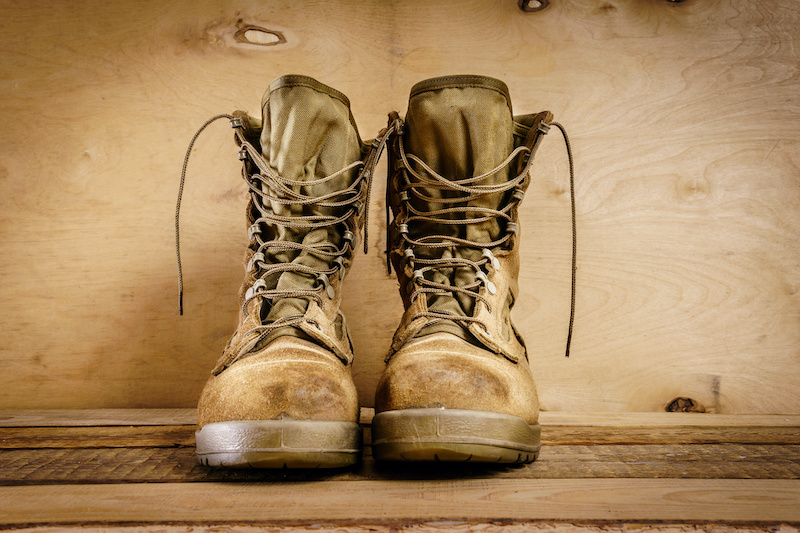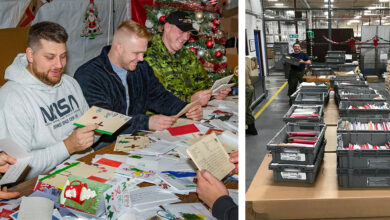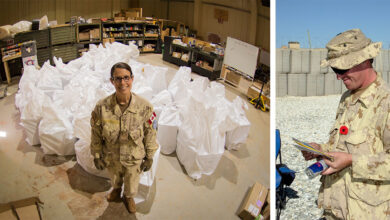 A lot of information is available for families on how to prepare for or survive a deployment. However, there are only a few books on how to manage reintegration: life before the deployment, what to expect, how to manage change (again) and how to get back into a groove that works for everyone.
A lot of information is available for families on how to prepare for or survive a deployment. However, there are only a few books on how to manage reintegration: life before the deployment, what to expect, how to manage change (again) and how to get back into a groove that works for everyone.
The popular civilian perception is what they see on YouTube videos – a couple running into each other’s arms, crying tears of joy. While there are tears and joy, there is more to it than that, and for many (myself included), the reintegration is often the most challenging part.

Feeling Anger, Resentment, Exhaustion, and Irritability
Often, people say and believe that you should just be grateful to have your family member home, and you are, BUT… you can sometimes feel anger, resentment, exhaustion, and irritability; everything your partner does causes annoyance and frustration. These feelings are normal. However, it is difficult not to feel guilty for feeling them, especially when everyone assumes you are just thrilled to be a family unit again and everything is rainbows and butterflies.
I got used to sleeping alone – I stretched across the entire bed, used all the blankets and pillows, turned on a light when I felt like it and went to bed when I wanted. I liked it. Of course, there were nights when I felt lonely, but I didn’t miss the snoring or being woken up when my husband came to bed late (he is a night owl, and it is a miracle if I am awake past 10 p.m.).
It was also hard to get used to having to share again and consider someone else’s schedule, thoughts, and feelings. These feelings were shared by my husband, too. He loved having a comfortable room, bed, privacy, not having sand in the bed, etc. Also, he did not need to consider anyone else for nearly a year. During reintegration, for at least three weeks after he returned, neither of us got a full night’s sleep. This did not help us as we did not feel rested, patient or forgiving!

No One Talks About
Sharing a room is only the tip of the iceberg. No one talks about how you go from being the one to making all the decisions and then have to revert to consulting and checking in or how there was no conquering and dividing while Dad was away. Our kids only had me to ask, and my word was final. While I didn’t enjoy being the only one saying “no” or making decisions all the time, in some ways, it was quicker and easier.
After each deployment, my husband and I have had to commit to ensure we only made decisions about important things after talking to each other. We created a shared calendar to understand better what is happening – making some decisions much easier as we cannot be in two places at once, but this all took months to work out and get used to.

A Place For Everyone & Everything
I feel at peace when my house is clean and tidy – I know it is a sickness. My daughter and husband see this as very low on their priority list. With my daughter, I can take away my financial support and not drive her to a friend’s house, etc. You really can’t do this with a husband. While he was away, I could keep the house the way I love it (most days). There were a few “nags” here and there, and my kids pitched in too. It was one of the most challenging things to readjust to when my husband came home. There were more shoes for me to trip over at the door, piles of electronics and other such things and a mess everywhere I looked.
Logically, I knew that he had been working eight months straight without much of a breather, as he didn’t get weekends or downtime to do what he wanted, and he had very little space of his own, so I tried to let it go. This only ever lasted a week or so, as I can’t function in chaos! What I have found successful is ensuring that he has spaces for his stuff throughout the house. During this last deployment, I redid the basement and found a bigger desk and a larger area for all my husband’s things. It helped as you never want a family member to feel like there isn’t space for them in their own home. I have learned to let go of that area of the house and try not to look too often.

Beating the Unappreciated & Resentful Feelings
Also, no one ever talked to me about the deep and sometimes burning resentment I would feel. I can own it now, but it was hard to acknowledge, as I know my husband wasn’t living it up, and he wasn’t on a long beach vacation. Nevertheless, I felt so resentful that I had missed job opportunities, chances to spend time with friends and family, missed out on special events and had to cook, clean, cut grass, shovel snow, repair things, pay bills, drive kids, walk the dog, grocery shop, and work full time on my own job!
My husband just had himself to look after. While I know deployments may not always be fabulous. However, meals were provided for him, and he had someone else cleaning it all up. I had very little time for myself and had to take on the workload of two people. I often felt unappreciated, making me resentful.
The problem is that when he came home, he was also exhausted and couldn’t just jump in and take over everything. The feelings of resentment do rear their ugly head every now and again, but talking about them does help, and time does heal these particular wounds. We returned to a shared routine and started having a little more time for ourselves. We eventually returned to our pre-deployment routine, where I had someone else to share the load with, until the next time!

Patience Stretched
Patience has never been a strength of mine. When you are readjusting to life as a family again, your patience will be stretched in ways you could never have envisioned. While experiencing all of the above, you will also see behaviour changes in your children. They can become anxious, easily frustrated, moody, withdrawn, unpredictable, and so many more things.
Most kids do not embrace change the way parents would love them to; our kids are no exception. It is a major readjustment for them, too, and there is no better way for them to express their displeasure than to take it out on their parents. The common misconception from teachers, coaches, friends and family members is that they will blissfully jump back into life as a complete family. They don’t. They need weeks and weeks of consistent routines and stability before the happiness kicks in. Before that, you may have misbehaving, moody and irritable children struggling to adjust to change similarly and differently.
Rollercoaster Ride for the Whole Family
Deployments are like a rollercoaster ride for the whole family. Some want to cry, some scream with fear, some laugh, some get stuck at the top, and some feel like throwing up, but eventually, you get off. This is military life. There are moves, deployments, exercises, courses, etc., that cause family members to be away for extended periods of time or significant upheavals for everyone.
While deployments are challenging, as is trying to come back together again as a family, you are not alone. Whether we say it or think it – we all experience the good and the bad of reunions. Being more aware of the ups and downs can make all the difference.











